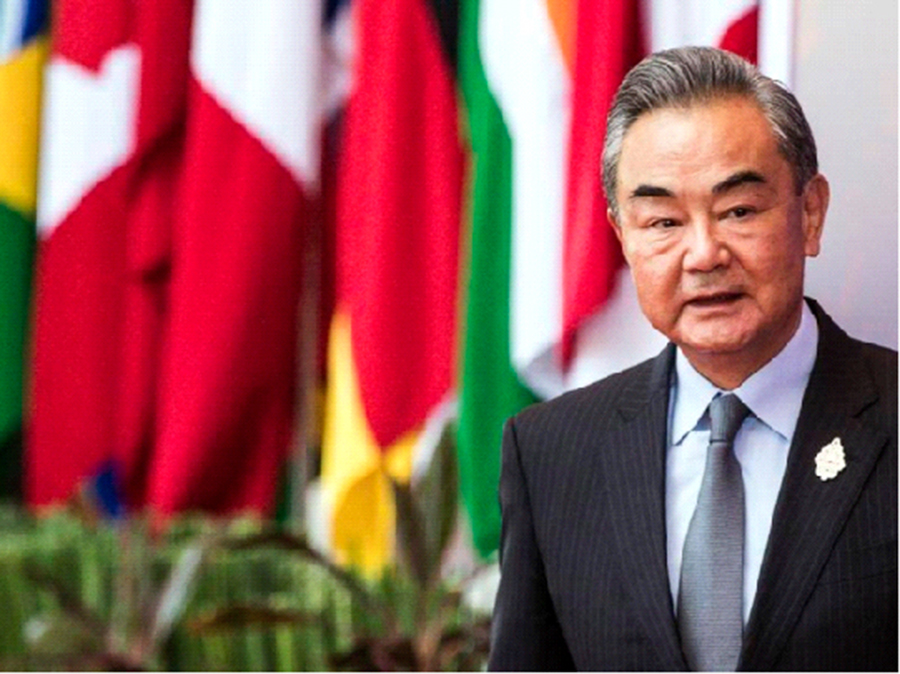BEIJING, (Reuters) – China named veteran diplomat Wang Yi its new foreign minister yesterday, removing former rising star Qin Gang after a mysterious one-month absence from duties barely half a year into the job.
Qin, 57, a former aide to President Xi Jinping and envoy to the United States, took over the ministry in December but has not been seen in public since June 25 when he met visiting diplomats in Beijing.
The ministry has said he was off work for health reasons without giving details, sparking speculation and drawing attention to the secrecy often surrounding China’s Communist leadership and decision making.
Qin’s successor Wang, 69, was also his predecessor, holding the post from 2013-2022 as ties frayed with rival superpower the United States to a point Beijing described as an all-time low.
He has filled in for Qin during his absence and this week represented China at a national security advisers’ meeting of BRICS countries in Johannesburg.
U.S. Secretary of State Antony Blinken met Qin on June 18, on the first visit by America’s top diplomat to China in five years. The U.S. State Department said then they held “candid, substantive, and constructive” talks and Blinken invited Qin to Washington to continue discussions.
Blinken subsequently met Wang on the sidelines of a regional meeting in Jakarta in Qin’s absence.
Chinese state media did not say why Qin was removed and China’s foreign ministry did not respond to a request for comment. Xi signed a presidential order to make the decision effective, state news agency Xinhua reported.
“The lack of an explanation opens more questions than provides answers,” said Ja Ian Chong, a political scientist at the National University of Singapore.
“It also underscores the opacity and unpredictability, even arbitrariness in the current political system.”
Qin’s apparent disappearance was not the first unexplained absence of a Chinese official.
Industry minister Xiao Yaqing vanished from public view for nearly a month last year before it was revealed he was being investigated for corruption.
U.S. State Department deputy spokesperson Vedant Patel told a regular briefing on Tuesday it was up to China to choose its foreign minister and Blinken had met Wang multiple times.
“We will continue to engage with Foreign Minister Wang Yi and other Chinese officials, and we continue to believe that keeping lines of communication (is) incredibly important,” he said.
Asked whether Blinken’s invite to Qin to Washington would be extended to his successor, Patel said: “Ultimately it would be for the PRC to announce any travel to the United States.”
Qin was one of China’s youngest foreign ministers, enjoying a meteoric ascent that analysts attributed in part to his closeness to Xi. He was twice foreign ministry spokesman, between 2006-2014, and chief protocol officer from 2014-2018, overseeing many of Xi’s contacts with foreign leaders.
He was posted to Washington as ambassador in July 2021, after a period of unusual public vitriol between U.S. and Chinese officials.
Wang retakes the foreign ministry helm as China seeks to re-engage with the world after years of COVID-induced isolation, as a mooted economic recovery fails to gain hold, and Beijing spars with Washington over issues from Ukraine, Russia and Taiwan to trade and technology disputes.
“The choice of Wang Yi is rational,” said Yun Sun, director of the China Program at the Stimson Center in Washington. “To convey a sense of stability and credibility, China needs to select someone who is senior, authoritative and impeccable.”
Wang was promoted last year to the politburo of the Chinese Communist Party, one of China’s top leadership bodies.
Hours after news of his reappointment, Pakistan’s Foreign Minister Bilawal Bhutto Zardari tweeted congratulations, saying Wang was “an astute and seasoned diplomat”.
Qin’s political future remains unclear. Analysts noted there has not yet been any clarity over whether he will still hold his role as state councillor, a member of China’s cabinet.
His name remained on the list of state councillors on the English-language webpage of China’s State Council website, while the page on China’s foreign ministry website that is typically filled with the biography of the foreign minister and readouts of his activities simply read “updating” on Tuesday.
“Qin’s removal without explanation has left intact the rumours and speculation about his disappearance,” said Dali Yang, a political science professor at the University of Chicago.
“His fate is left hanging and is a glaring reminder of the opacity of the Chinese political system.”
Asked about Qin by reporters, deputy U.N. spokesperson Farhan Haq said: “Certainly we wish him well. We hope he’s well. But in terms of questions about officials of the government of (the People’s Republic of) China, I believe you need to ask those to the government.”






